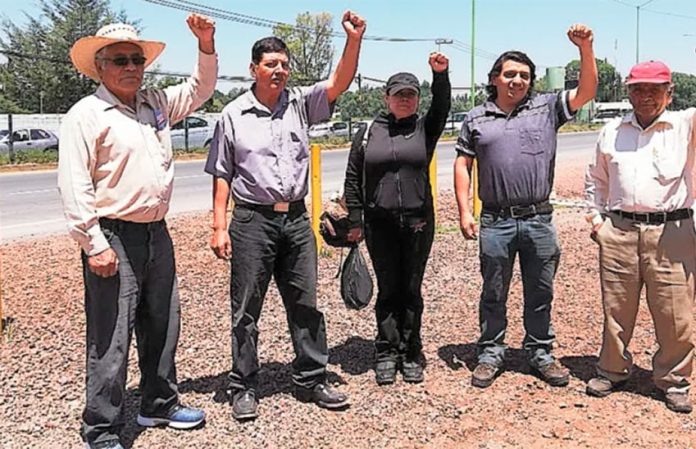A federal judge has rejected a request for a definitive suspension to the Santa Lucía airport project, accepting the Defense Secretariat (Sedena) argument that halting construction could place national security at risk.
The September 23 ruling came in response to an injunction request filed by a representative of the indigenous people of Santa María Ozumbilla, a México state town just south of the air force base site where the airport will be built.
The newspaper El Universal said the Mexico City-based administrative judge could make similar rulings in Sedena’s favor in response to more than 100 injunction requests filed against the airport by the #NoMásDerroches (No More Waste) collective and the indigenous peoples of Tecámac, México state, who are concerned about the environmental impact of the project, including pressure on already depleted water resources.
The legal action has prevented the government from starting construction of the US $4.8-billion airport, which is part of the plan to relieve pressure on the Mexico City airport and replaces the previous government’s project at Texcoco.
In Monday’s ruling, the judge said that national security must prevail over the social interests of the complainants.
The decision overturned a provisional suspension order that also stipulated that the federal government must consult with local indigenous people before proceeding with construction.
Sedena opposed the latest injunction request on the grounds that all of its movable and immovable property, including the Santa Lucía airport project, were classified as strategic installations on August 29.
The judge ruled that the construction of the airport, a road link to the existing Mexico City airport and the relocation of military facilities on the base are directly related to matters of national security.
However, the ruling doesn’t bring the injunction request filed by the Santa María Ozumbilla representative to a definitive end because another hearing on the matter, which has been tentatively set for October 4, must be held.
Lawyers for Sedena, which has been given responsibility to build the airport, can expect to spend a lot of time in court in the coming weeks and months.
Requests for injunctions, several of which have been granted, seek to stop construction based on concerns related to the environment, air security and the rights of indigenous peoples, among other issues.
Sedena filed an appeal on September 4 in response to a definitive suspension order request against the airport project which – in contrast to Monday’s ruling – was issued.
The defense department was to argue in court on Tuesday that the injunction and others that have been granted were contrary to the national interest. But the judge cancelled the hearing without setting a new date.
However, the newspaper Milenio reported on Wednesday that a hearing will take place on Friday to determine whether the injunctions will be lifted.
Whether they are overturned or not could hinge on the view taken by the Supreme Court (SCJN).
The court’s Second Chamber is scheduled to consider today the contradiction between the different rulings issued by two courts: that handed down on Monday rejecting the request to definitively suspend construction of the airport and the one that did grant a definitive suspension order to the #NoMásDerroches collective.
The court’s ruling will set a precedent that must be followed by judges of lower courts but Milenio noted that the SCJN could determine that there is no discrepancy between the two rulings because they were made in response to different claims.
Although a hearing has been set for Friday, judicial officials said that it is probable that it too will be postponed as #NoMásDerroches waits for the National Security Council to comply with its request for a list that details all facilities located at the air force base.
The collective, which is pushing for work on the Texcoco project to resume, believes that the list will support its argument that halting work on the Santa Lucía airport is not contrary to the national interest.
It argued on Monday that a ruling in Sedena’s favor would set a “worrying precedent” because “it would open the door to future appeals to ‘national security’ and public order to deny citizens their right to seek injunctions.”
The collective also said that the “federal judicial power has the non-delegable duty to protect Mexicans against any abuse by the authorities.”
President López Obrador has maintained that the opposition to the airport is politically motivated and amounts to “legal sabotage.”
At his regular news conference on Wednesday morning, he defended the government’s decision to fight the injunctions using the national security argument.
The president, whose decision to cancel the Texcoco airport was made in part because he believed the project was corrupt, told reporters that the defense on national security grounds doesn’t mean that the government will seek to be secretive about the execution of the Santa Lucía plan.
“The decision has [already] been made that there will be transparency,” he said.
Source: El Universal (sp), Milenio (sp)
